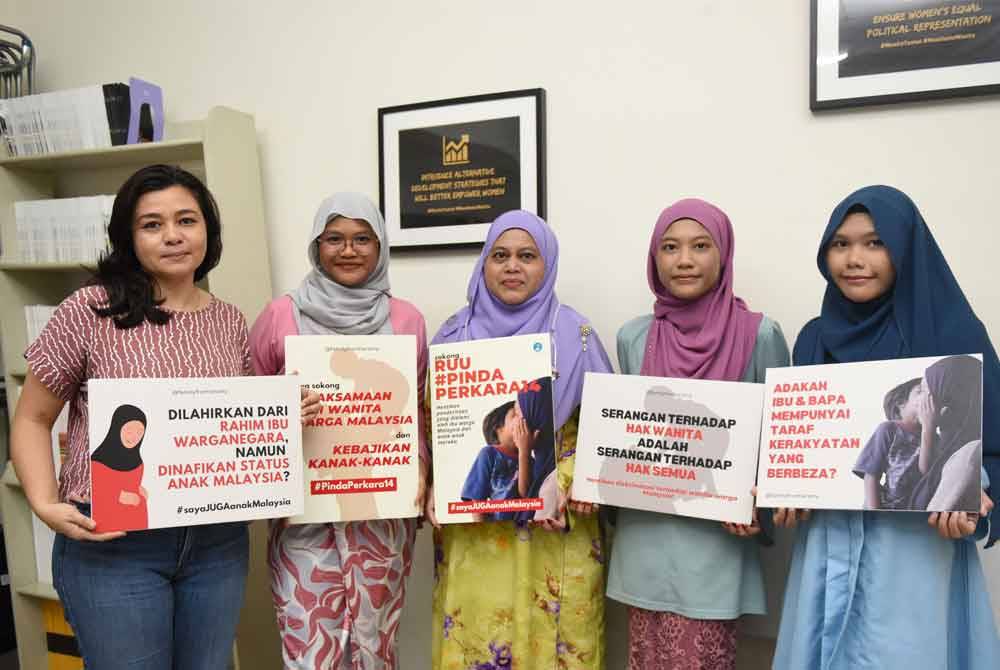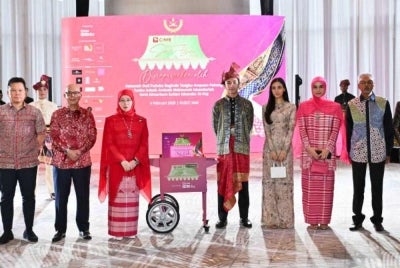Justice for mothers: Amendment promises equal citizenship rights for overseas-born children
The amendment would affect 688 citizenship status applications for children born overseas to Malaysian mothers who are married to foreign spouses.

SHAH ALAM - After a long wait, women received joyful news in conjunction with the celebration of the International Women's Day on March 8, as the Cabinet approved the proposed constitutional amendments concerning the citizenship rights of children born abroad to local mothers married to foreign spouses.
Following a three-month interval, the draft prepared by the Attorney General's Chambers (AGC) to amend Article 14(1)(b) by including the word "mother" aimed to enable Malaysian mothers to also confer citizenship to their children by operation of law has been tabled in Parliament.
Under the Federal Constitution, there are three ways to obtain citizenship which are by operation of law, registration and naturalisation under Articles 14, 15, 16, 19, and 30 of the Federal Constitution.
Understanding these primary provisions involved examining and supporting dozens of other acts and regulations such as the Births and Deaths Registration Act 1957, National Registration Act 1959, States Islamic Family Law Enactments, Passport Act 1966 and Immigration Act 1959.
This complexity in the legal framework made the process of amending the constitutional provision time-consuming and comprehensive.
Article 14(1)(b) of the Federal Constitution specifically grants the right to Malaysian men to confer citizenship to their children born abroad by operation of law.
On the other hand, Malaysian mothers have long borne the burden of gender discrimination, as women could not automatically confer citizenship to their children who were born abroad and their children had to apply for citizenship under Article 15(2).
Humanitarian spirit and justice
Faculty of Law and International Relations lecturer Dr Hussain Yusri Zawawi said the amendment would affect 688 citizenship status applications for children born overseas to Malaysian mothers who are married to foreigners.
"The amendment reflects the Malaysian government's concern for the well-being of mothers giving birth to children abroad with the assurance of citizenship.
"Indirectly, this elevates the status of children in terms of welfare, education, healthcare and safety. Simultaneously, this amendment reflects the humanitarian spirit and justice," he told Sinar.
He added that by granting citizenship rights to children born abroad, Malaysia has demonstrated an open and inclusive attitude towards the global community in line with humanitarian values.
"This amendment can have a positive impact on Malaysia's image internationally by showing the world that it values the sacrifice and dedication of a mother in securing citizenship for her child.
"It can strengthen Malaysia's image as a progressive and responsive country to current issues," he said.
Hussain emphasised the crucial role of the Constitution in altering perceptions or laws that might be perceived as biased or unjust towards women in Malaysia, particularly regarding their automatic eligibility for their children's citizenship compared to men.
"The word "father" in Section 1(b) Part II of the Second Schedule of the Federal Constitution refers only to the father and does not include the mother.
"In the current context, the Federal Constitution stated that citizenship by operation of law for children born on or after Malaysia Day must follow the father's status.
"This means that this provision prevents Malaysian women married to foreigners from passing on their citizenship status to children born abroad. Therefore, this constitutional amendment is essential to uphold women's rights," he said.
Eliminate regressive amendments
Meanwhile, Association of Family Support and Welfare Selangor and Kuala Lumpur (Family Frontiers) president Suriani Kempe said although the amendment brought good news, the government should not abolish other citizenship rights as stated in the Constitution through five regressive amendments.
"These include the amendment of Section 19B, Part III of the Second Schedule, Section 1(a), Part II of the Second Schedule, Section 1(e), Part II of the Second Schedule, Article 26(2) and Article 15(A).
"These regressive amendments will lead to injustice and increase the risk of vulnerable children in Malaysia becoming stateless," she said.
Family Frontiers, which has advocated for the rights of mothers fighting for citizenship for their children, believed that progressive amendments that gave equal rights to mothers in conferring citizenship to their children should be separated from these five regressive amendments.
"Before these amendments were presented in Parliament, we sincerely hope that progressive amendments are separated from these five regressive amendments that will victimise vulnerable children in Malaysia.
"The government needs to continue making amendments that support the rights of mothers and women but repeal other regressive amendments to ensure justice for children in Malaysia," she said.
INFORMATION
Total number of citizenship applications received by the Home Ministry - 150,000
Number of citizenship status applications for children born abroad to Malaysian mothers married to foreign spouses - 688
TIMELINE:
DEC 18, 2020
- Family Frontiers filed a constitutional challenge through an originating summons at the Kuala Lumpur High Court to seek a declaration that Malaysian women married to foreign men can automatically confer citizenship to their children born abroad. Along with six Malaysian mothers, they named the government, the Home Ministry and the National Registration Department (NRD) director-general as defendants.
MAY 6, 2021
- The High Court rejected the government's application to strike out the originating summons.
MAY 17, 2021
- The government filed an appeal at the Court of Appeal against the High Court's decision which dismissed its application to strike out the case. While awaiting the appeal hearing, the government filed an application for a stay of the hearing of the originating summons at the High Court pending the disposal of the Court of Appeal's decision.
AUG 19, 2021
- The High Court rejected the government's stay application and decided to hear the originating summons on Aug 24, 2021.
SEPT 9, 2021
- The High Court declared that children born abroad to Malaysian citizen mothers and fathers automatically have the right to Malaysian citizenship.
SEPT 22, 2021
- Former home minister Datuk Seri Hamzah Zainudin announced a new government policy to amend the constitution to facilitate mothers to confer citizenship to their children born abroad even if they were married to foreign nationals. However, he emphasised that the matter needed the consent of the Conference of Rulers.
AUG 5, 2022
- The Court of Appeal ruled that children born abroad to Malaysian mothers married to foreign spouses were not entitled to Malaysian citizenship under the law. A three-man bench led by judge Datuk Kamaludin Md Said made the decision after allowing the government, Home Ministry and NRD director-general's appeal.
DEC 14, 2022
- The Federal Court ruled that children born abroad to Malaysian mothers with foreign spouses are entitled to Malaysian citizenship after allowing the Family Frontiers' appeal.
MARCH 8, 2024
- Home Minister Datuk Seri Saifuddin Nasution Ismail confirmed that the Cabinet approved the proposed constitutional amendments regarding the citizenship rights of children born abroad to Malaysian mothers married to foreigners during a Cabinet meeting.
Download Sinar Daily application.Click Here!














